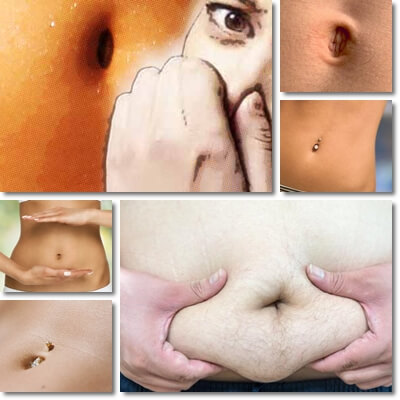A bad belly button smell is a fairly common occurrence for many people and usually not a reason for concern. Unless you’re looking to get something out of your belly button, usually either food crumbs, dust balls or lint, you might not even realize it smells bad. For the most part, a clean belly button doesn’t smell. But a sweaty or dirty one will. The smell can actually be perceived as terrible: pungent, acrid or sour or particularly unpleasant, cheese-like or even slightly fish-like. But as long as there are no other symptoms except for the bad smell and that goes away after cleaning the belly button with some soap and water, it’s likely not a reason for concern.
Why does your belly button smell bad (stink)?
The most likely, most common cause why your belly button smells bad or even stinks is because it’s not clean. Either not clean right now or not clean for some time. The belly button is bound to collect sweat, skin oils, old skin cells, dust, dirt and microorganisms. After all, it’s a small cavity in the abdominal area. While it’s not high maintenance, it does require frequent cleaning, daily or more than once a day, depending on how active of a lifestyle you enjoy. If it’s not being cleaned as often as it requires, it will begin to smell bad, in both men and women. Find out below what are the most likely causes why your belly button stinks.

Your belly button is sweaty
The belly button is a depression, a cavity and will collect sweat coming down the abdomen. While sweat itself doesn’t smell, it does feed the bacteria living on the skin, including on the skin around and inside the belly button. This causes a bad odor and, consequently, a smelly or downright stinky belly button. It goes without saying that, the more your sweat and the longer you go without washing, the more pregnant the odor.
Your belly button is dirty
As a cavity, the belly button will inadvertently collect lint from clothes or sheets, dust balls, dirt, food crumbs, old skin cells, sweat, skin oils (sebum) and bacteria. Lint, dust balls, food particles lock in bacteria, sweat and sebum. Both sweat and sebum feed bacteria helping their numbers grow. And the longer the belly button is left unwashed, the more of everything it accumulates, increasing the likelihood of bad smells.
You have an active infection
If there are other symptoms in addition to the odor, such as redness, itchiness or a smelly discharge coming from the belly button, then these indicate an infection. An infection is possible in both children and adults. Redness in and around the belly button, a constant need to scratch the area and especially a oozing belly button that leaks and smells bad are clear signs of an infection (bacterial, fungal, rarely parasitic). Scratching with dirty hands, dirty piercings, infected cysts, excess sweating, poor hygiene are all contributing factors.

Other causes of belly button smell
Excess weight and belly button piercings and rings can represent sources of infection and bad smells. Skin conditions such as dry skin, eczema or seborrheic dermatitis could contribute to the stinky odors. Existing cysts, clogged pores, ingrown hairs can become infected. Wearing tight clothing, sweating and not washing or leaving the belly button damp are sources of both infection and unpleasant odors.
Foods such as garlic, onion, leek or chives cause bad body odors which are released into sweat and can lead to bad smells all over the body. Trimethylaminuria, or fish odor syndrome, is a condition causing a person’s breath, sweat and urine to have a fish or otherwise strong, unpleasant odor. Stress worsens skin conditions and anxiety causes excessive sweating, both contributing factors. Also find out why the back of the ears might smell like Parmesan cheese in cheese smell behind ears.
Tips and solutions for a stinky belly button
A bad smelling belly button is a common occurrence, more so in adults. If you do experience a bad belly button smell, you may find some help in some of the tips and solutions listed below:
- Wash your belly button regularly (frequently) with soap and water to remove the smell (daily or more often than that).
- Dry the area well to discourage fungal infections in particular. Because the belly button is like a depression sometimes, it can help to rub a towel over it, then let it air out for 15 minutes.
- Avoid touching, picking at or scratching your belly button with dirty hands. The area inside the belly button is especially apt at retaining bacteria and makes an ideal environment for bacteria growth because it’s warm and moist.
- Clean and disinfect belly button piercings regularly. Use silver piercings to reduce infection risks.
- Look for signs of an infection: redness, itching or a discharge, often foul-smelling (like cheese, poop or fish odors). Seek medical attention in such cases.
- In case of a diagnosed infection, take prescribed antibiotics or antifungals as directed by your doctor.
- Manage existing conditions accordingly (skin conditions, stress, anxiety etc.).
- Wear loose-fitting clothes from natural fabrics to reduce sweating in warmer weather.
- Consider eliminating potentially problematic foods such as garlic, leek, chives or onions, but also coffee, caffeinated beverages, alcohol and processed foods.
You can also read about my experience with garlic body smell.
How to clean the belly button
How do you clean your belly button to avoid bad smells? Below is a list of helpful pointers for proper belly button hygiene:
- Remove any lint, dust balls, dirt or food crumbs from the belly button before proceeding to wash it.
- When showering, gently but vigorously rub the belly with soap and water for a few of seconds, then rinse well. Repeat for a more thorough cleaning or if necessary.
- Some people like to wash the inside of the belly button with soap and water, either with their index finger or the index finger covered in a soapy washcloth. Remember to use gentle moves and do not force anything.
- Dry the area well with a clean towel. To make sure there is no water left to encourage the growth of microorganisms which causes bad belly button smells, I like to use a hair drier set on low heat for a couple of minutes. Or air it out.
- If you are dealing with bad belly button smells regularly, wash daily and after all sweat-promoting activities. For example, after exercising, doing manual labor (yard work, moving furniture), being outdoors in hot weather, swimming and other similar physically engaging activities.
